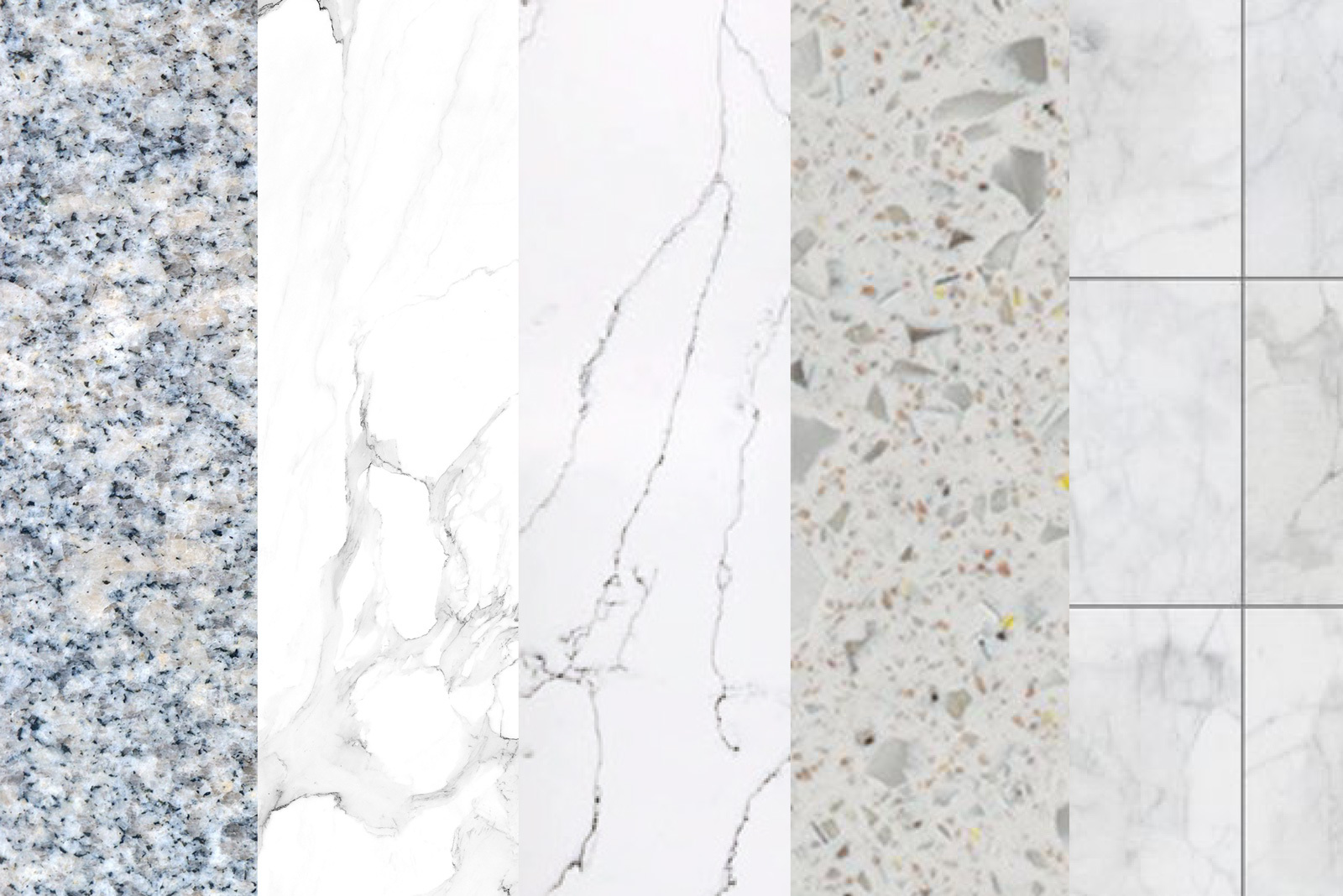Granite, marble, quartz… With all of the options out there, it can be difficult to choose a stone for your counters! There are pros and cons to all of the options from color choices to durability to purchase and upkeep costs. So how do you pick the perfect stone?
We’ve put together a list of tips for choosing just the right one for your design and needs. Check out our highlights of several options below!
Appearance
The first thing you notice when you walk into a kitchen or bathroom is how it looks, so choosing the perfect stone slab to complement your color scheme and style is an important decision.
Natural Stone
- Marble boasts a timeless appearance, multiple finish options and colors (like gray, white, black, pink, orange or red), and the fact that it’s a natural stone means each slab varies in appearance.
- Granite has a distinctive, natural look and comes in a variety of shades, often with striking accent flecks.
- Quartzite offers a marble-like appearance and comes in shades of white or gray, although various shades of pink and red are also common.
Manufactured Slabs
- Quartz offers many finish options, such as polished, honed and natural-feel, as well as a wide variety of colors and veining.
- Tile slabs are manufactured using the raw materials found in glass, porcelain and quartz and come in a variety of naturally-occurring colors.
- Solid surface slabs offer a wide variety of colors and textures for a large range of design versatility.
Durability
Looks aren’t everything, though, and you want to be sure you can keep up with the countertop you’ve chosen. Check out how each of these stones stacks up against the rest.
Quartz ●●○○○
Quartz is made from one of the hardest minerals on earth and offers the look of natural stone without the required maintenance. It boasts a nonporous, crack-, scratch-, stain- and heat-resistant material that makes it a durable option.
Tile Slabs ●●○○○
Tile slabs are easy to clean, and the hardness of the material means it is resistant to scratching, abrasions, water, household chemical cleaning agents, UV rays, fire and cold weather.
Granite ●●●○○
Granite has a lower porosity than other natural stones, making it one of the more durable choices. It is less likely than other options to stain or scratch, and its strength and sustainability means less sealing and maintenance for a great, user-friendly solution.
Quartzite ●●●○○
Quartzite’s durability equals less upkeep than other natural stones. Made predominantly from silica, the hardness of quartzite makes it extremely resistant to water absorption, heat and scratches – ideal for indoor and outdoor use. It also has a very high resistance to acidity, which allows for much less concern for upkeep.
Solid Surface ●●●○○
Solid surface slabs are often chosen for commercial spaces since it is both durable and hygienic. Made from a combination of acrylic resin and natural materials, solid surface options are nonporous, making them extremely durable and hygienic without requiring a sealant, and accidental scratches can be restored easily by a trained professional.
Marble ●●●●○
Marble is a luxurious and sophisticated material that does come with a higher amount of maintenance than other types of stone. Because it’s a porous, naturally-occurring substance, it can scratch, etch and absorb spills. But, with the proper sealing and upkeep, marble can be a great selection for your home, especially in bathrooms where less traffic occurs.
Cost
Although design tastes may vary, one concern on every shopper’s mind is the price tag of each stone. Less expensive doesn’t always mean cheaper, though, and more expensive upfront doesn’t mean it’s not worth considering for the long run. Upkeep should definitely be a factor in your decision!
Granite $-$$$
With a lower porosity than other natural stones, granite is less likely to stain or scratch and often requires less sealing and maintenance, making it a great, user-friendly solution.
Quartz $$-$$$$
A nonporous, durable option, quartz offers the look of natural stone without the same required maintenance.
Solid Surface $$-$$$$
In the middle of the price range are solid surface slabs. As one of the top choices for commercial purposes, this material also boasts a versatility for residences. This material doesn’t require a sealant, but scratches will need to be restored by a trained professional.
Marble $$-$$$$$
This natural stone is a classic choice, and the cost for a slab can vary depending on color, veining and the location where it was quarried. Marble does also require more upkeep costs over time for proper sealing and upkeep, but its higher cost pays off in a timeless selection for any home.
Tile Slabs $$$-$$$$
This nearly indestructible material can be used for interiors or exteriors, including counters, floors, sinks and walls. Tile slabs are scratch-resistant, easy to clean and the investment in this material upfront will equal fewer upkeep costs in the long run.
Quartzite $$$-$$$$$
With its marble-like appearance and durability that equals less upkeep than other natural stones, quartzite can be on the higher end of the price spectrum. However, those pros are great reasons to choose this stone, as it will pay off in the long run. The hardness of quartzite makes it extremely resistant to water absorption, heat and scratches, which makes it an ideal solution for many uses, including kitchens, walls, and more.
Choosing a slab is an important decision for any homeowner. Whether you’re still trying to narrow down exactly what you want, or you know which material you’d like and want to check out color options, we can help! Give us a call or visit our showroom; we can’t wait to see you!

